Early childhood is a crucial period for social development. Fostering connection in the dynamic environment of preschool and kindergarten lays the groundwork for a pleasant learning experience. One enjoyable approach to accomplish this is to use “get to know you” games for preschoolers and kindergarten that are meant to break the ice and develop bonds among young learners.
Why Ice Breaker Games are Important for Young Students
Icebreaker activities are essential in the early education of young students because they provide more than just entertainment. These activities are critical for fostering an inclusive learning environment, especially in preschool and kindergarten students.
The first day of school can be intimidating for younger students, and a fun icebreaker activity can help alleviate tension and build a sense of comfort. A preschool game, often a favorite game of many young students, helps them gain essential social skills and establish a friendly environment.
Incorporating engaging ice breaker questions into the get-to-know-you games enhances the experience. These activities give preschool children structured opportunities to communicate and contribute. New students form friendships and set the groundwork for teamwork via cooperative play and conversation.
This early social skill development is also critical, as it sets the basis for positive social interactions throughout a child’s educational journey. Fun icebreaker activity or get to know you games can significantly help preschoolers the development of confidence in small children.
Children discover and express their particular abilities in a supportive setting as they participate in various activities. Positive encouragement from classmates and teachers during fun icebreaker games contributes to developing a child’s self-esteem.
Building Community and Camaraderie
Building community and promoting camaraderie are the essential benefits of using fun icebreaker games on the first day of school. These activities foster a sense of community among preschool children, creating the framework for a connected classroom environment.
Children establish a feeling of shared identity through collaborative play throughout a preschool game. This shared experience serves as the foundation for establishing a healthy classroom culture in which new students feel a feeling of unity and mutual understanding.
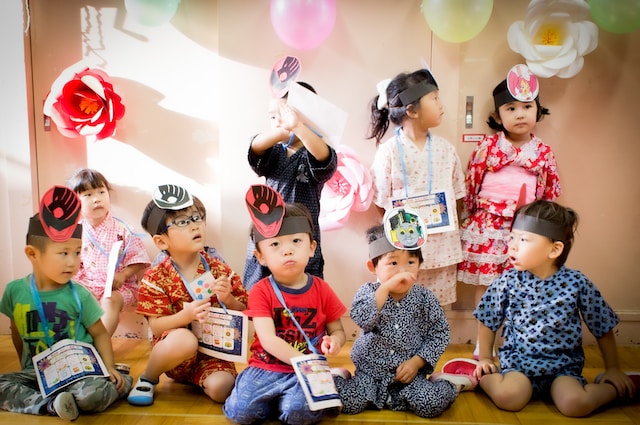
In preschool and kindergarten students, camaraderie is critical since it contributes to a peaceful learning environment. Icebreaker activities and get to know you games encourage preschoolers and young children to engage personally by facilitating relationships beyond academic interests.
Furthermore, the benefits of a great icebreaker game transcend beyond the local classroom environment. Students are more ready to manage social dynamics and contribute positively to larger group situations as they carry these positive experiences throughout their education.
Early childhood friendship also lays the groundwork for a favorable attitude toward teamwork and cooperation. In this sense, a great icebreaker game plays a vital role in creating a fun environment and nurturing the social fabric that supports a child’s growth and development over time.
Learning to Appreciate Differences
A fun ice-breaker game in early education not only helps foster community and camaraderie, but it also teaches younger students the value of respecting diversity. These activities provide a space where children can exhibit their personalities and interests in an accepting environment.
Students must learn early on that diversity is something to value and respect. These simple icebreakers allow children to explore and appreciate the distinctions among their peers. Whether it is by sharing preferred pastimes or expressing personal preferences, icebreakers promote open communication.
As students interact, they realize that everyone adds something unique to the table. This early exposure to diversity builds the groundwork for a worldview that values differences rather than seeing them as obstacles.
The principles taught through fun ice breaker games also extend beyond the classroom. These activities teach children essential life qualities and genuine interest in the world around them by instilling respect for differences at a young age.
Students learn that each individual is unique as they negotiate their peers’ diverse histories and viewpoints during these activities. As a result, fun ice breaker games can help shape not only the classroom atmosphere, but also the mindset and attitudes of young learners.
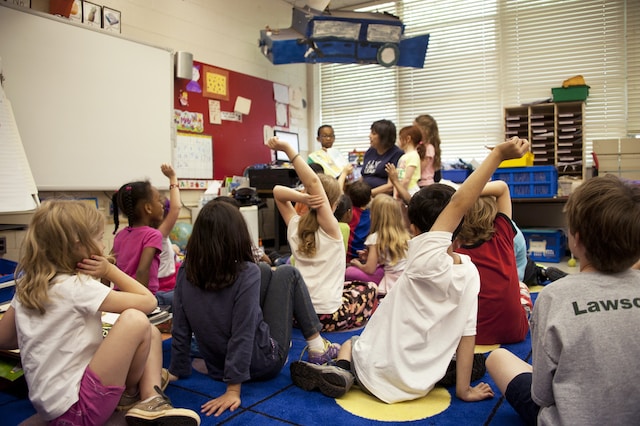
Developing Class Etiquette and Culture
In early school settings, simple icebreakers play a vital role in establishing class etiquette and culture. These exercises lay the groundwork for establishing behavioral norms, encouraging pleasant interactions, and fostering an entire class culture that values respect.
Children learn to navigate social settings and acquire a sense of responsibility for their peers as they play these games. Participation in a fun ice-breaker game contributes to a healthy and polite classroom environment.
Students learn the value of active listening, taking turns, and respecting personal boundaries via structured activities. These early teachings in classroom manners help to establish a cohesive and well-mannered learning environment.
Furthermore, icebreaker games allow teachers to foster qualities like kindness, teamwork, and inclusivity. Educators establish the groundwork for a healthy learning environment by infusing these ideas into the fabric of the classroom.
Young students also gain a collective awareness of the significance of treating one another with compassion as they participate in games encouraging empathy and understanding. Developing these values in the early stages of school helps create a culture that encourages a sense of belonging.
Game and Activity List
Early education is about creating a social and emotional environment for young minds. This entire preschool and kindergarten game list includes icebreaker questions and activities, including the kids’ favorite game, to make learning interesting and interactive.
From indoor to outdoor settings, these activities aim to break down the early barriers of shyness among young learners. Incorporating thought-provoking icebreaker questions and interactive activities ensures that young minds actively participate in conversations that promote social development.
Indoor Games
When the weather outdoors is not cooperating, or if you just want to add some energy to the entire class, this collection of indoor activities for preschoolers and kindergarteners is ideal.
Indoor games are designed to suit the dynamic character of young brains restricted within four walls. Prepare to witness the joy and camaraderie that these indoor games bring as we explore this list of activities.
#1 Simon Says
Simon Says converts the old game into a fascinating icebreaker for toddlers and kindergarteners. When the selected student offers directives that begin with “Simon says,” the other children must obey. This exciting game makes introductions to classmates an entertaining experience.
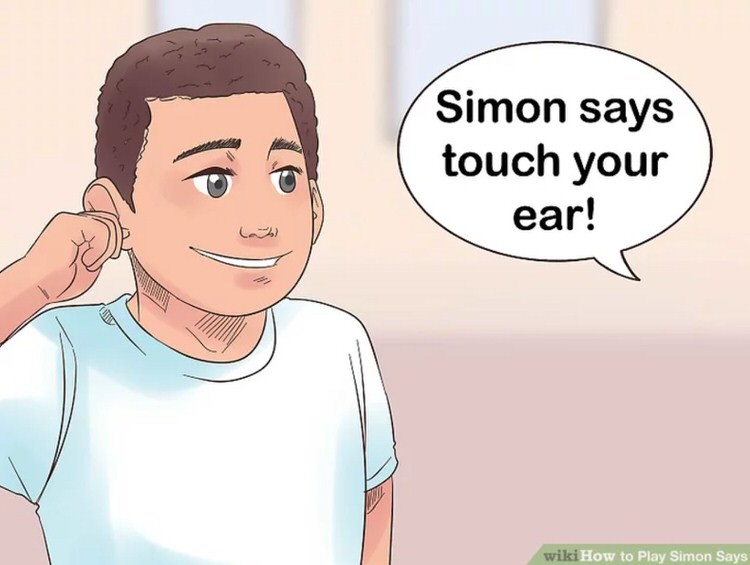
#2 My Favorite Thing
In the My Favorite Thing game, each kid can share their most treasured item or anything, whether it is their favorite toy, favorite place, favorite TV show, favorite color, favorite subject, favorite drawing, etc. The My Favorite Thing activity enables kids to express themselves based on common interests and likes.
In the Great Wind Blows, you will need a few seats (one less than the number of participants). The game is easy; one person in the middle begins by stating, “Great wind blows for everyone who…” and then states whatever quality that individual possesses.
For instance, “Great wind blows for someone with a sister.” All players with a sister must get up and choose a new seat more than two chairs away from them as soon as possible. If the player cannot locate a vacant seat, they become the new person in the center.
In the Red Light Green Light, the appointed leader issues commands, and the children respond by moving or freezing. The game’s primary purpose is for children to reach a predetermined finish line by obeying the leader’s directions of “red light” and “green light.”
To play, designate one kid as the “leader” or “traffic controller.” The leader then says, “Green light!” and turns around to face the other kids. When “Red light” is yelled at, the kids must instantly freeze.
#5 Would You Rather
Would You Rather is a great ice breaker game that encourages preschoolers and kindergarten to talk and tackle different questions that make them laugh. The game includes providing kids with various alternatives to ice breaker questions and asking them to choose between two.
The Line-up Game encourages young learners to work together and communicate effectively. In the Line-up Game, students must arrange themselves according to a specified characteristic, such as height, age, etc. The task is to build a line according to the supplied directions without using words.
#7 Musical Chairs
Musical Chairs offers a humorous twist to the meet-and-greet encounter. Children dance outside of the circle of chairs as music plays, hoping to get a seat when the music stops. The Musical Chair also helps kids improve their listening abilities and social skills.
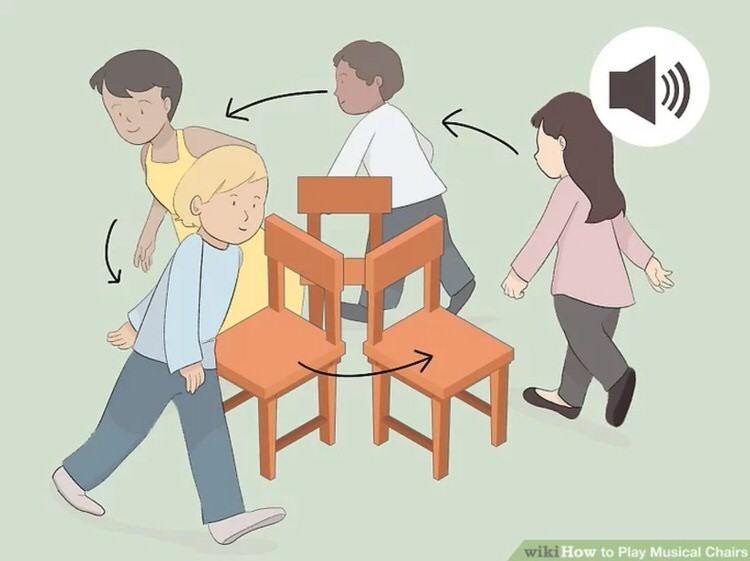
#8 Two Truths And A Lie
Two Truths And A Lie is another great ice breaker game that promotes self-expression. Each student takes turns revealing three claims about themselves, two of which are true and one is false. The remainder of the group of children then attempt to figure out which of the statements was a lie.
#9 Guess The Animal
Guess The Animal is a fun game in which each kid takes turns creating the sound of their favorite animal without disclosing which one it is. The other group of children then attempts to identify the favorite animal based on its action or sound.
#10 Human Bingo
Human Bingo is a dynamic icebreaker that turns regular bingo into a social activity. Each student gets a bingo card with phrases, such as “has a pet cat” or “visited a beach.” The aim is to fill the card with the student who matches each statement. This game enables kids to communicate and ask different questions, creating friendships based on shared experiences.
#11 The Tallest Tower
In the Tallest Tower, participants are separated into small groups and given a set of materials, such as building blocks or any other acceptable objects. The aim is for each group to collaborate to build the tallest tower possible in the shortest amount of time.
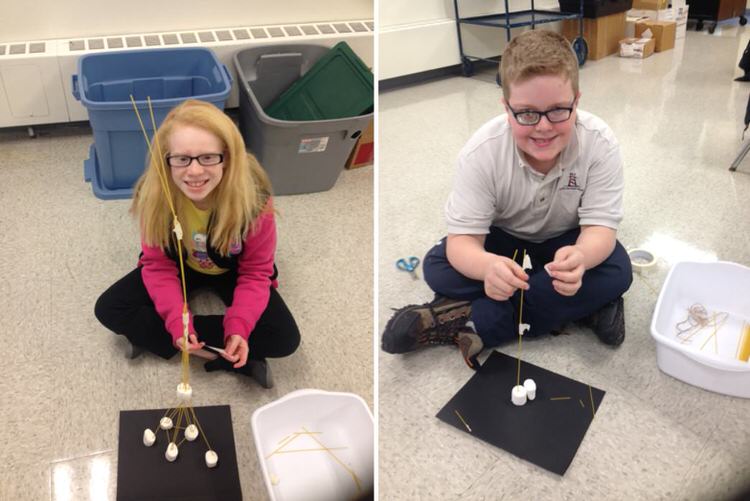
#12 Who Stole the Cookie from the Cookie Jar?
Who Stole the Cookie from the Cookie Jar is a classic game that typically begins with participants forming a circle and one child chosen as the ‘detective’ sitting in the center. A cookie jar is placed in the center of the circle.
The group, including the detective, chants the rhythmic question, ‘Who stole the cookie from the cookie jar?’ The child accused then responds, pointing to another participant who must, in turn, deny the theft. The excitement builds as the ‘thief’ is eventually revealed.
#13 Teddy Bear Introduction Game
The Teddy Bear Introduction Game is a touching game in which kids bring their beloved teddy bears or any favorite stuffed animal to school. Each kid presents their teddy bear or stuffed animal and shares a narrative about it. This game provides a safe and familiar environment for kids’ self-expression.
To play the Guess My Favorite Song icebreaker, make little slips of paper and each participant will write the title of their favorite song and fold it. Participants take turns disclosing and guessing information about their favorite song without explicitly declaring the title.
Outdoor Games
These outdoor get to know you games for preschoolers and kindergarteners are designed to maximize the use of the great yards outside. These games try to combine the perks of physical activity with the delight of social connection, from exciting tag variations to nature-inspired scavenger hunts that spark curiosity.
In this section, we invite educators and parents to explore various outdoor games that educate children and help them form lifelong friendships with their fellow learners.
#1 Duck Duck Goose
Duck Duck Goose is a high-energy icebreaker encouraging movement and social interaction. Seated in a circle, one child walks outside of the circle, tapping others on the head, calling out “Duck” until deciding on a “Goose.” The selected child then chases the first child around the circle. Duck Duck Goose gets the children moving and promotes a sense of excitement and camaraderie.
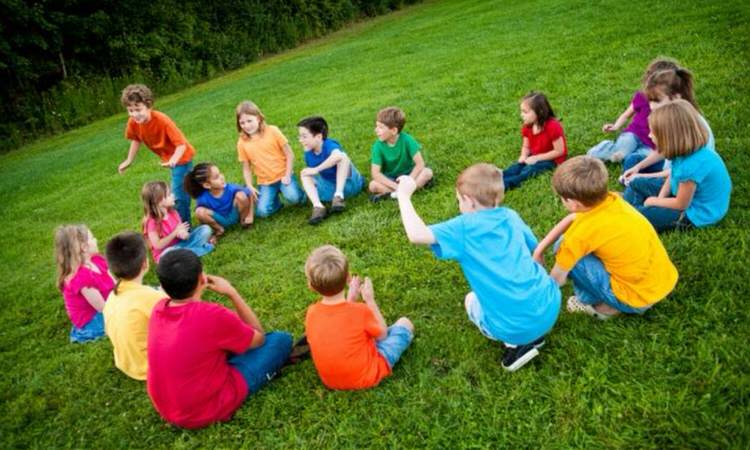
#2 Scavenger Hunt
In Scavenger Hunt, children embark on a quest to find hidden treasures or specific items, promoting teamwork and exploration. The Scavenger Hunt game introduces preschoolers and kindergarten to the joy of discovery while fostering collaboration among peers.
The Hot Potato game injects a burst of energy into the get-to-know-you session. As children pass the ball around the circle to the beat of the music, they have five seconds or fewer to throw the ball to another person in the circle.
You may also modify things to make the Hot Potato game more appropriate for children’s requirements. For example, urge them to yell out the name of the person to whom they are tossing the ball to promote friendship.
#4 Group Jump Rope
Group Jump Rope is an exhilarating activity that combines physical exercise and team building. Instead of individual jump roping, this game uses a larger rope held by two kids on each end, with the remainder of the larger group jumping in and out collectively.
#5 Beach Ball “Get to Know You”
The Beach Ball adds a fun aspect to the classroom introduction process. To begin, the person holding the beach ball says someone’s name and tosses the ball to that person. The kid who catches the ball must say their initial name and one fact about themselves. They then throw the ball to another group member.
The facts to share might vary from favorite color, favorite TV show, favorite subject, or favorite place they’d like to visit.
Crocodile Race is a fast-paced, cooperative game that blends mobility and collaboration. Children construct a crocodile chain by standing in a line and grabbing onto the waist of the kid in front of them. The goal is to move like a crocodile without breaking the chain.
#7 Hopscotch
Hopscotch is a timeless and flexible game that provides physical exercise and a platform for social interaction. To play, hop across a sequence of numbered squares painted on the ground to win the game. Each kid takes turns throwing a marker and jumping between the squares in the correct order.
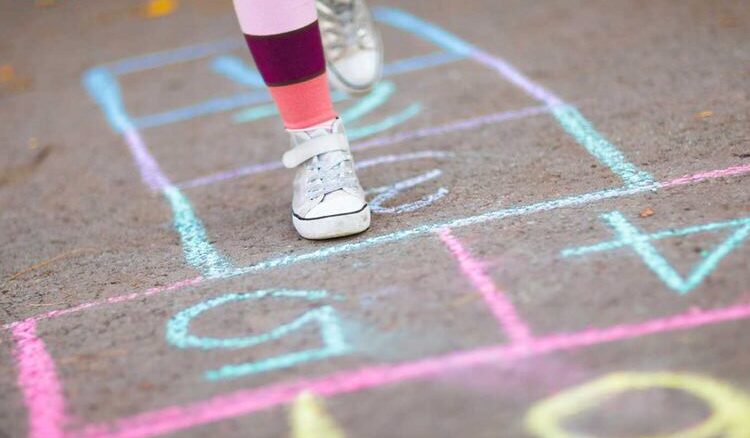
#8 Tag
Tag is a timeless game that encourages physical exercise in young students. In a traditional game of tag, one kid is chosen as “it” and is responsible for chasing and tagging the other players, who subsequently become “it.” This cycle continues, producing a lively and exciting environment.
#9 Connecting the Yarn
In this game, children sit in a circle, each with a ball of yarn in their hands. They pass the ball of yarn to a colleague as they share something about themselves, forming a network of interwoven yarn. This exercise creates togetherness and stresses the value of each child’s unique contribution to the group.
#10 Color Hunt
Color Hunt is a fun and instructive game encouraging kids to explore their surroundings. Children are assigned a color to find in the room or outside environment. They collaborate to locate things of the same color, fostering collaboration and color awareness.
#11 Relay Races
This game is a high-energy exercise that improves physical coordination and collaboration. Children are separated into groups, and each member takes turns fulfilling a job, such as sprinting to a specific location or carrying an object.
#12 Follow The Leader
The traditional game of Follow the Leader encourages listening skills and social engagement. One student takes on the role of “leader” and leads the others in different movements such as skipping or clapping hands. The other youngsters replicate the leader as they move across the allocated zone.
Extend your child’s learning experience beyond the confines of the regular classroom. Explore more insightful information and articles to create a more enjoyable and fulfilling educational experience!
- 40 Fun Games for Online Students on Zoom, Teams, and Google Meet
- 20 Fun Online Sight Word Games For Kindergarten Students
- 35 Fun Music Games For 1st Grade Through 4th Grade (Classroom or Home)

Kiezela Quiz once whizzed through clouds as a flight attendant, but her love for books and penning down thoughts lured her back to solid ground. Now, she is a full-time writer, and every week she dishes out articles on education, gaming, and pretty much anything that sparkles under the sun.

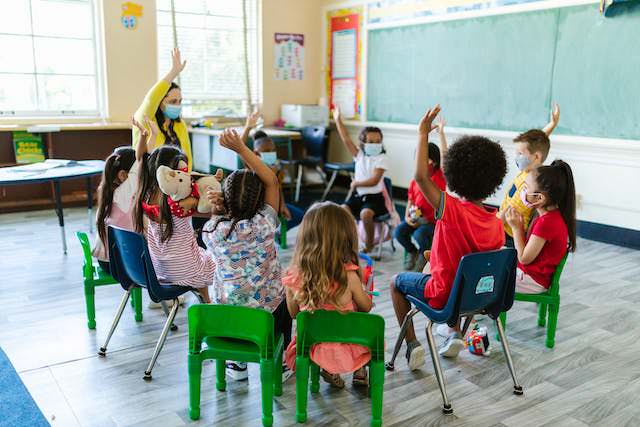







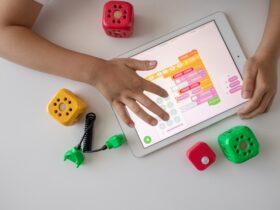




Leave a Reply